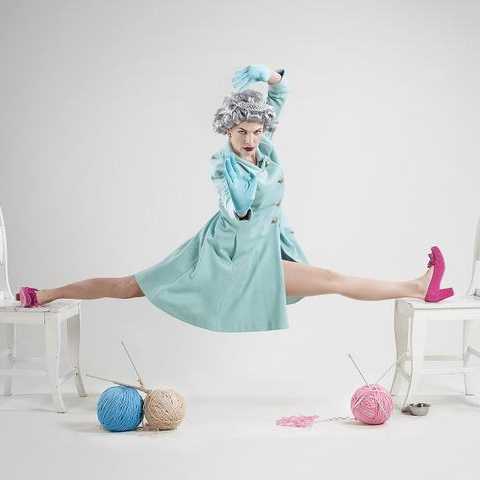Erarta Galleries
8 Berkeley Street
London
W1J 8DN
United Kingdom

Erarta Galleries London with The Fourth Height + Urs Bigler bring The Crown to Diamond Jubilee London. The photographic exhibition is 'the multicultural trash-dreaming†vision of The Fourth Height, a troika of colourful Russian artists (Dina Kim, Katya Kameneva, and Gala Smirnskaya) working in collaboration with renowned Swiss photographer Urs Bigler. Following the successful exhibition at Volta New York last year, Russia comes to London's summer celebrations in the shape of an extraordinary, much talked about exhibition.
The exhibition presents a series of highly aesthetic photographic images that capture the artists as they stage three intertwined narratives: The power of femininity, capitalism versus Russia's folk tradition, and the societal and geographical challenges the Russian continent-country has faced since its birth.
Drawing upon the visual rhetoric of the feminist movement, and referencing such iconic artists as Cindy Sherman, The Fourth Height, like Sherman, examine identity and representation within society. Where Sherman focused on women, The Fourth Height have chosen as their protagonist the complex notion of 'Russian-ness†in the post-Soviet reality. The fabricated identities and transformative ambiguities within the photographs raise post-war, social, geo-political, and feminist issues. These striking images see the three artists representing Europe, Russia and Asia confronting the dilemma facing Russia today, with Europe seemingly represented by Britain's very own head of state. A rich traditional heritage interlaced with style, wit and a large dose of irony produces images unseen in Russian art since the heady days of the Tsarina. This triumvirate of artists refuse to accept the old idea of Mother Russia as a simple bridge between the two cultures of East and West, with Russia seen positioned uncomfortably between the two continents. The Crown explores the new era, gently and playfully suggesting that Europe is perhaps in need of a younger face, Russia is now a main protagonist, while Asia is becoming increasingly similar to the West, though perhaps sinisterly so.
The representation of the three world powers are cleverly balanced and contrasted with political correctness in tenuous balance. Europe is shown yawning, sleeping, and, as previously mentioned, having a minor cosmetic procedure performed to sort out those unfortunate frown lines between the eyes that can make the face look overly severe. But while Europe may be aging, she is still fighting fit. In Warming Up the dogs have trotted off and she has abandoned her knitting to prepare for battle. Athletically balanced between two chairs performing truly exceptional splits, Europe's gaze is focused and fierce, not a hair is out of place and her delicate crown is perfectly positioned. When presenting a narrative project like The Crown, The Fourth Height view everything from a position of questioning and use contradiction of presentation as a tool to further their critical and playful approach to image making.
This vision of the mighty yet fragile amazons as re-enacted by Kim, Kameneva and Smirnskaya, who rule, fight, and suffer yet soldier-on in perpetuum is epitomized in Trinity. Here the struggle for equilibrium is based on force, and in this instance, Russia has taken centre stage and seems to have the upper hand. But all is not decided; Asia is drawing her sword. But is Russsia ready for her new roll as the East-West power broker? In post-Soviet society, Russia is all too often defined by what it is not - no longer Imperial, no longer Soviet, no longer communist, Russia must forge a new identity that will be defined by what remains of the USSR, the non-Russian republics having formed an identity and left. Treading on the trajectory of what defines 'Russian-ness', The Fourth Height + Urs Bigler mark their distinctive cultural point on the strengths and the weaknesses of the mystery that Russia still is today. Guilt free and in perfect tune, The Fourth Height + Urs Bigler take full ownership of Russia's Imperial and Soviet past and offer a series of strikingly beautiful photographs in jubilation of the wisdom of history, art, and, above all, life.
